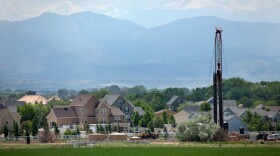
Grace Hood
Iââââââââ
-
More than a decade ago, the issue seemed distant to Americans' experiences. But now polls show a dramatic rise in concern, driven partly by extreme weather.
-
Many cities are converting to LED streetlights. The move can help restore darker skies and make stars visible again, and they also save energy and money. But some LEDs emit light that disrupts sleep.
-
Last August, 3 million gallons of orange wastewater flooded into Colorado's Animas River, ending up in Lake Powell. But Congress has failed to come up with a way to stop this from happening again.
-
Climate change is affecting what visitors see in Mesa Verde National Park. Over the past decade, scorching wildfires have destroyed archaeological artifacts — and have also revealed new ones.
-
The entrance fees at some national parks increase on Thursday. It will help with upkeep of restrooms and trails, but it's likely to be a drop in the bucket.
-
The U.S. Fish and Wildlife Service announced Tuesday the greater sage grouse does not need protections under the Endangered Species Act. The move is being celebrated by Western states and industry stakeholders because they say a listing would cost them billions of dollars in economic activity. But some environmental groups say the bird should be listed as endangered, and they plan to file lawsuits.
-
Colorado will need more water to supply the state's fast-increasing population. So two large reservoir projects have been proposed, but some Coloradans worry about the dams' possible ecological harm.
-
Chapel of the Interlude in Drake, Colo., was damaged in 2013 when a flood brought mud, sticks and other debris into the building. So the aging congregation came together and restored their oasis.
-
Colorado is embroiled in debate over how to regulate oil and gas development. Up to four energy-related issues could be on the November ballot, and the run-up is causing confusion among voters.
-
Colorado flooding has prompted an unprecedented challenge for the state's oil and gas industry. The practice of hydraulic fracturing is widespread along the state's Eastern Plains, but overflowing rivers have swept away equipment and caused more than 37,000 gallons of oil to spill into or near rivers.






